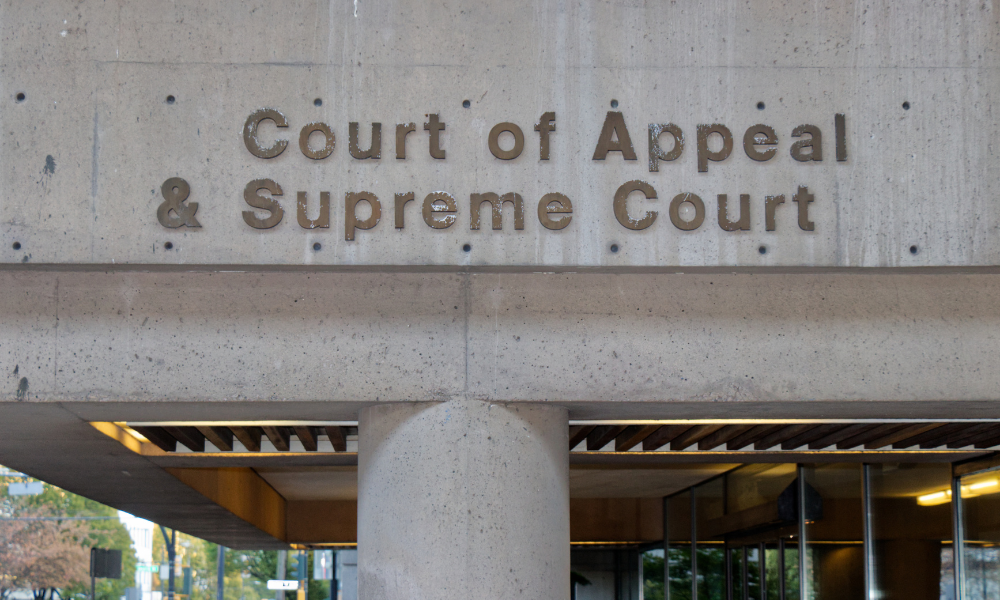
Ruling finds error in sentencing judge's approach to Indigenous offender's circumstances

In an aggravated assault case, the British Columbia Court of Appeal replaced the custodial sentence with a conditional sentence upon ruling the Gladue principles required it to sentence the Indigenous offender differently from how it would a non-Indigenous offender.
The appellant in R. v. Davis, 2025 BCCA 113, belonged to the K’ómoks First Nation. In January 2023, when he was 20 years old, he was talking to his mother on the phone when she got into a motor vehicle accident that involved another man.
The appellant thought he could hear the man shouting over the phone, assumed his mother was in danger, and hurried to meet her. At that time, the man involved in the incident was returning to the scene of the accident after buying cigarettes at the store for the appellant’s mother.
The mother attempted to stop her son, but he walked quickly toward the man and punched him in the middle of his forehead. The victim lost consciousness and fell to the ground.
Upon realizing what he had done, the appellant apologized and tried to help the victim. He waited for paramedics and police to come and admitted his responsibility for the injury. He eventually pleaded guilty to aggravated assault.
The judge sentenced the appellant to 21 months’ imprisonment and one year’s probation. The judge considered the punch very serious, as well as life-threatening and life-altering for the victim. The judge found that the punch caused a skull fracture and severe brain injury and later led to speech aphasia, memory loss, and other cognitive deficiencies.
The appellant requested a conditional sentence on appeal. He alleged that the original sentence was unfit and that the sentencing judge made errors by:
The appellant argued that the legislation and case law required the judge to pay particular attention to the circumstances of Indigenous offenders when considering every available sanction apart from imprisonment that would be reasonable in the circumstances and consistent with the harm to victims or the community.
The Crown conceded that the judge made an error in principle in his sentencing approach. The Crown accepted that the judge should not have ignored or minimized the appellant’s circumstances as an Indigenous offender simply because he had overcome his challenges to some extent.
The Court of Appeal for British Columbia granted leave to appeal, allowed the appeal, set aside the 21-month custodial sentence, and instead set a conditional sentence of two years less a day plus 12 months’ probation on the same terms as the judge imposed.
The appeal court noted that sentencing judges should help reduce incarceration rates for Indigenous offenders by seriously considering conditional sentences when the statutory requirements for such sanctions were present.
In this case, the appeal court ruled that the sentencing judge made a material error when he gave less weight to the Gladue factors’ impact on the appellant’s moral blameworthiness based on his success despite those factors – his graduation from high school, his employment, and his lack of negative peer associations, addiction issues, and criminal history.
The appeal court held that the appellant’s circumstances as an Indigenous offender diminished his moral culpability. The appeal court noted that the appellant grew up while dealing with poverty, domestic abuse of his mother by his father, and substance misuse by both parents.
The appeal court found that the appellant – called a “protector” to his female family members – was acting to defend his mother from a man that he wrongly assumed was endangering her on the day of the incident. The appeal court concluded that socio-political factors influenced the appellant’s overreaction to and assault of the victim.
The appeal court decided to impose a fresh sentence due to the judge’s material error. The appeal court noted it should count the appellant’s time in prison beginning November 2024 as part of the two-year conditional sentence.
The appeal court detailed that the appellant should: